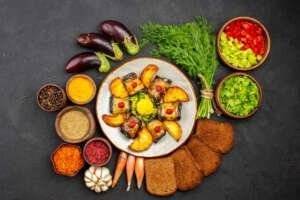Plantar fasciitis is a common condition affecting the plantar fascia, the thick tissue band running from the heel to the toes. This condition often leads to heel pain and discomfort, especially during prolonged standing or walking. While rest, physical therapy, and stretching are effective treatments, incorporating anti-inflammatory foods into your diet can significantly aid recovery and reduce symptoms.

Understanding Plantar Fasciitis and Inflammation
Plantar fasciitis primarily stems from inflammation of the plantar fascia, often caused by repetitive stress, overuse, or injury. This inflammation triggers pain, swelling, and stiffness. Addressing this inflammation is a critical aspect of managing and healing plantar fasciitis, and a targeted diet can complement traditional treatments effectively.
Role of Anti-Inflammatory Foods
Anti-inflammatory foods contain nutrients that help reduce inflammation, alleviate pain, and promote healing. Integrating these foods into your daily diet supports your body’s natural recovery processes, helping you heal more efficiently.
Key Anti-Inflammatory Foods for Plantar Fasciitis

- Omega-3 Fatty Acids
Omega-3s are potent inflammation fighters, reducing pro-inflammatory markers in the body.- Sources: Fatty fish like salmon and mackerel, as well as flaxseeds, chia seeds, and walnuts.
- Turmeric
Known for its active compound, curcumin, turmeric reduces inflammation effectively.- Tips: Add turmeric to curries, smoothies, or tea. Pair it with black pepper to enhance absorption.
- Berries
Berries such as blueberries, strawberries, and cherries are rich in antioxidants like anthocyanins and vitamin C, helping reduce inflammation and support tissue repair. - Ginger
Ginger contains gingerols and shogaols, which are known for their anti-inflammatory properties.- How to Use: Incorporate ginger into teas, smoothies, or stir-fries for natural pain relief.
- Leafy Greens
Vegetables like spinach, kale, and Swiss chard are packed with vitamins A, C, and E, which support healing and reduce inflammation. - Olive Oil
Extra virgin olive oil contains healthy monounsaturated fats and polyphenols that combat inflammation. - Green Tea
Green tea is rich in EGCG, a polyphenol that reduces oxidative stress and inflammation. Consuming it regularly offers noticeable benefits. - Whole Grains
Options like oats, quinoa, and brown rice provide fibre and essential nutrients, supporting digestion and reducing systemic inflammation.
Lifestyle and Dietary Tips for Recovery
While anti-inflammatory foods are crucial, a comprehensive approach is key to effective plantar fasciitis recovery:
- Stay Hydrated: Proper hydration ensures optimal tissue health and supports healing.
- Maintain Balanced Meals: Incorporate diverse nutrients, including proteins, vitamins, and healthy fats, in every meal.
- Practice Portion Control: Spread meals throughout the day to sustain energy levels and enhance nutrient absorption.
- Pair Diet with Physical Therapy: Exercises and stretches combined with an anti-inflammatory diet yield the best results.
- Limit Inflammatory Triggers: Reduce processed foods, refined sugars, and trans fats, which may exacerbate inflammation.
Conclusion
Recovery from plantar fasciitis requires a multifaceted approach involving physical therapy, rest, and proper nutrition. By integrating anti-inflammatory foods such as omega-3-rich fish, berries, turmeric, and green tea into your diet, you can reduce inflammation, alleviate pain, and support long-term foot health. A balanced diet not only accelerates recovery but also improves overall well-being, helping you regain mobility and prevent future flare-ups.
Before making significant changes to your diet or treatment plan, consult a healthcare professional for personalized guidance tailored to your condition.
Reference
- Plantar Fasciitis (n.d.). Anti-Inflammation Diet for Plantar Fasciitis. Retrieved from Plantar Fasciitis


